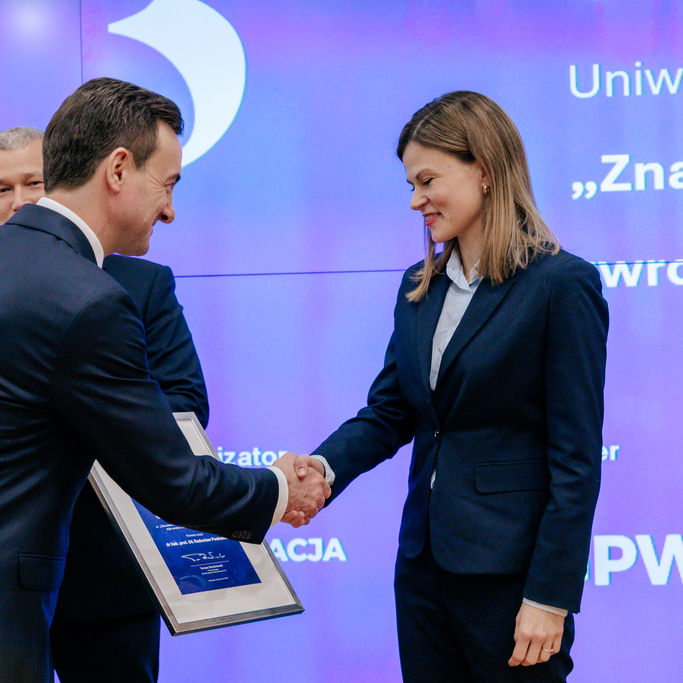Equality in education between women and men is the foundation of a just society in which everyone has equal opportunities to develop and contribute to science, technology and innovation. Despite significant progress in recent decades, women are still a minority in STEM (science, technology, engineering, mathematics) fields. According to the data of UNESCO, globally women make up about 33% of scientific researchers, and their share in the new technologies and engineering sector is even lower. Cultural, social and structural barriers still make it difficult to fully realise their potential, which is why it is so important to support initiatives that promote equity in science.
In the STEM area (science, technology, engineering, mathematics), we should mention programmes such as: L'Oréal-UNESCO For Women in Science, European Platform of Women Scientists (EPWS), International Astronomical Union Women in Astronomy Working Group.
Among Polish initiatives, significant programmes supporting women in science include: "Dziewczyny do ścisłych!" and "Dziewczyny na politechniki!", "Lean in STEM", "Innovator of the Year" Competition, Women in Technology, Leaders of the Future.
Thanks to such programmes, more and more women are choosing careers in science and technology, breaking stereotypes and structural barriers. However, we are still more likely to encounter women in the humanities and social sciences. They take up issues of equality, social policy or culture but also face barriers in accessing better positions or more significant grants. Therefore, initiatives promoting the presence of female scientists in these fields are as important as those supporting women in STEM.
What do female scientists from the University of Lodz think about equality between women and men in science?
Female scientists who have recently been recognised for their broadly understood contribution to the development of science shared their opinions with us. We asked them the following question:
Does science have a gender?
To expand on this thought: "Has anyone interviewed encountered a situation in their professional life where gender worked to their advantage or disadvantage?"
Is science a woman? It is definitely a women's strength!
Science is a variously defined element of culture characterised by the pursuit of knowledge. It is a special type of human cognitive activity that examines the reality of nature and culture in an institutionalised, methodical and formalised way.
For centuries, science was reserved exclusively for men. It is demanding and possessive of family and friends, but a the same time generous to those women who devoted their time to its development.
Science is undoubtedly the strength of women, but today it requires a constant struggle from them. It requires to struggle not only for our position in this still male world, but for issues important for the development of science (fighting for grants, research internships, money for the publication of a monograph, or participation in a conference), issues related to the operation of the university (hours, teaching load, students, MA students, doctoral students, points for slots), fight for current affairs (for a table, a room, reagents or books).
Science requires women to make everyday choices – maintain work-life balance – share the responsibilities of a scientist and lecturer with time for family and friends.
– says dr hab. Monika A.Król, Associate Professor at the University of Lodz from the Faculty of Law and Administration. .
Prof. Monika A. Król, following elections held at the end of 2024, was granted membership in the International Academy of Comparative Law (Académie Internationale de Droit Comparé).
In Polish, the word "nauka" (science) is feminine, but for centuries science was almost exclusively accessible to men. Today everyone knows, quoting the iconic "Seksmisja", that Copernicus was a woman!
But seriously, science, understood as the pursuit of knowledge, has no gender. In turn, scientific research is conducted by people with their own everyday problems, which influence, for example, the pace of their work. Women who decide to become mothers, due to the special role of the mother in the family – both biological and social – certainly face different problems than men. However, this does not mean that these difficulties are insurmountable. From my own experience I know that with the right support from beloved ones, many difficulties can be overcome and a balance can be found to continue developing a scientific career.
– comments Dr Olga Krzeczewska from the Institute of Finance at the Faculty of Economics and Sociology of the University of Lodz.
Science is a woman – this is how I can think of myself and other fantastic female scientists who I have the pleasure of working with at the University of Lodz, in the International Cluttering Association (ICA), and meet at scientific conferences or in projects. However, science is not just a woman. Science is any person who inquires, studies and persistently strives for the truth. Science is people. Science is every person who creates it. And – in my opinion – this human dimension is the most valuable in science
– says Dr Monika Kaźmierczak z Instytutu Filologii Polskiej i Logopedii na Wydziale Filologicznym Uniwersytetu Łódzkiego.
Dr Monika Kaźmierczak has been elected by the international community of speech therapists to the position of Chair-Elect of the Executive Committee of the International Cluttering Association. As the Chair-Elect of the ICA Executive Committee, she is the only Polish woman on the board of the International Cluttering Association (ICA) and the first Polish speech therapist in this position.
Science should not have a gender, and it seems to me that the problem of inequality between women and men in academia is gradually disappearing. More and more female scientists hold key positions within universities and research institutes, organisations associating representatives of the academic community, and international and national research teams.
As a doctoral student, I have never experienced any discrimination based on gender. Moreover, I have noticed that young female scientists not only implement ambitious research projects, but also actively work for their community, constituting its extremely important voice. National doctoral organisations are a good example. Currently, the National Representation of Doctoral Student and the four most important inter-entity agreements associating people pursuing a doctorate are led by women. This is undeniable proof that women in science can and want to play key scientific and social roles
– believes mgr Monika Wilanowska, a doctoral student at the University of Lodz Doctoral School of Social Sciences.
Mgr Monika Wilanowska, a doctoral student at the University of Lodz Doctoral School of Social Sciences, has won the DOCUP Competition of the Doctoral Forum of Polish Universities for the second time.
In my opinion, science has no gender, it is beyond division according to any criteria. I have never experienced gender discrimination and being a woman has never been an obstacle in any aspect of my professional career. My teachers, my masters, were women – very strong women who were very successful in science. They have paved the way. The vast majority of women I have met in my professional career are distinguished by a number of very positive traits: reliability, diligence, objectivity, generosity, the ability to work in a team and willingness to work for the common good
– says dr hab. Joanna Petera-Zganiacz, Associate Professor at the University of Lodz, from the Department of Geology and Geomorphology at the Faculty of Geographical Sciences, University of Lodz.
Dr bab. Danuta Dzieduszyńska, Associate Professor at the University of Lodz, from the same Department adds:
Science in Polish is female, (ta nauka). When I think about science, I guess subconsciously I always think about her. Despite this, I believe that science has no gender. It is about everything and for everyone. It is a universal good. My gender has never been an obstacle to achieving my professional goals or developing my scientific career. I work mainly in teams and regardless of the "parity" in its composition, I always feel in my place. Perhaps I've been lucky, but I can't think of a situation where I was marginalised in any way because of being a woman. I think that diversity is the driving force behind progress and that everyone can find their place in science.
In the world of artificial intelligence, where I am active, men predominate, but women have definitely entered this world for good. They conduct scientific research and manage research teams, cooperate with business, successfully combining science and practice, and hold high positions in bodies responsible for creating the framework for further development of this technology and research on it. AI is a technology capable of defining new horizons of human possibilities, regardless of country, industry, market sector, scientific field and discipline and, above all, gender. It has an impact not only on what we know, but also on who we can be in the world of science
– coments Dr Dominika Kaczorowska-Spychalska, Associate Professor at the University of Lodz, Head of the Centre for Intelligent Technologies at the Faculty of Management, University of Lodz.
Dr Dominika Kaczorowska-Spychalska, Associate Professor at the University of Lodz, Head of the Centre for Intelligent Technologies at the Faculty of Management of the University of Lodz, has co-created as an expert the “Substantive recommendations for the document ARTIFICIAL INTELLIGENCE DEVELOPMENT POLICY IN POLAND 2025-2030. They document has just been published by the Ministry of Digital Affairs.
An image of science as a space in which women play an increasingly important role, but which still poses challenges, emerges from the statements of the female scientists. Thus, we are faced with an interesting paradox. Today, women are leaders in research, they manage teams and scientific institutions, but they still face challenges; some of them still have to "fight" – for research funding, for positions, for work-life balance, and sometimes for such mundane things as "a seat at the conference table". They still have to prove that their presence in science is natural. If it's so obvious, why are we still talking about it?
However, they all agree on one thing – science gives great satisfaction.
Science, although theoretically neutral, has for centuries been a male privilege – and although this has changed, remnants of the old order are still visible. One might get the impression that although the presence of women in science is of course accepted, the system is still not fully adapted to them.
We may therefore be tempted to pose an intriguing thought: do female scientists really want “equality” in the classical sense, i.e., adapting to the rules that men created long ago? Or will real change come only when these rules are rewritten – in a way that not only “fits” women into science, but makes science a more inclusive, flexible and open space for diverse ways of conducting research and building careers? Perhaps the future of science is not just more women in the world of current academic hierarchies, but a new approach to what science is and how it functions?
On the International Day of Women and Girls in Science, I wish all my brave and courageous colleagues: perseverance, passion and satisfaction from their profession. Success in science brings great joy and the fulfilment of our dreams
– dr hab. Monika A. Król, Associate Professor at the University of Lodz.
We join in!
Profiles of the scientists who have co-created the text:
 Dr hab. Monika A. Król, Associate Professor at the University of Lodz, is a scholarship holder of the Council of Europe, a member of the International Academy of Comparative Law (Académie Internationale de Droit Comparé), the World Union for Agricultural Law UMAU, the European Council for Rural Law CEDR, and the President of the Audit Committee of the Polish Association of Agrarian Lawyers. She has served as Secretary General of the International Section of the ISSA on Prevention in Agriculture for several years. She was appointed by the Minister of Climate and Environment to the Scientific Council of the Institute of Environmental Protection National, Research Institute in September 2024 and by a resolution of the scientific council, to serve as the President of the Council in October 2024.
Dr hab. Monika A. Król, Associate Professor at the University of Lodz, is a scholarship holder of the Council of Europe, a member of the International Academy of Comparative Law (Académie Internationale de Droit Comparé), the World Union for Agricultural Law UMAU, the European Council for Rural Law CEDR, and the President of the Audit Committee of the Polish Association of Agrarian Lawyers. She has served as Secretary General of the International Section of the ISSA on Prevention in Agriculture for several years. She was appointed by the Minister of Climate and Environment to the Scientific Council of the Institute of Environmental Protection National, Research Institute in September 2024 and by a resolution of the scientific council, to serve as the President of the Council in October 2024.
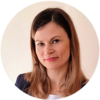 Dr Olga Krzeczewska graduated from the University of Lodz in Finance and Accounting with a specialisation in Corporate Financial Management. She has been employed at the Department of Corporate Finance since 2016. Her research interests focus on corporate bankruptcies and corporate finance (in its broad sense). She holds a certificate of accounting specialist from the Association of Accountants in Poland and has experience in working in departments related to accounting and financial analysis in international corporations.
Dr Olga Krzeczewska graduated from the University of Lodz in Finance and Accounting with a specialisation in Corporate Financial Management. She has been employed at the Department of Corporate Finance since 2016. Her research interests focus on corporate bankruptcies and corporate finance (in its broad sense). She holds a certificate of accounting specialist from the Association of Accountants in Poland and has experience in working in departments related to accounting and financial analysis in international corporations.
D r Monika Kaźmierczak is a Polish philologist, a speech therapist, a voice trainer, a voice disorder rehabilitation specialist, an expert in glottodidactics and a WWR therapist. She has been working at the Department of Polish Dialectology and Logopaedics as an Assistant Professor since 1 October 2015. Previously, in the years 2004-2015 she worked at the Department of Polish Language and Literature Teaching, University of Lodz. She defended her doctoral thesis written under the supervision of dr hab. Teresa Świętosławska, Associate Professor at the University of Lodz, in 2007. She was an active Polish language teacher in high schools in Lodz for 19 years. In her research and speech therapy practice, Dr Monika Kaźmierczak focuses on disturbed discourse and issues related to the prevention and rehabilitation of voice disorders of various etiologies. For several years now, she has been exploring the secrets of incoherent speech. She founded and runs the "Grupa G (jak GIEŁKOT)" on Facebook..
r Monika Kaźmierczak is a Polish philologist, a speech therapist, a voice trainer, a voice disorder rehabilitation specialist, an expert in glottodidactics and a WWR therapist. She has been working at the Department of Polish Dialectology and Logopaedics as an Assistant Professor since 1 October 2015. Previously, in the years 2004-2015 she worked at the Department of Polish Language and Literature Teaching, University of Lodz. She defended her doctoral thesis written under the supervision of dr hab. Teresa Świętosławska, Associate Professor at the University of Lodz, in 2007. She was an active Polish language teacher in high schools in Lodz for 19 years. In her research and speech therapy practice, Dr Monika Kaźmierczak focuses on disturbed discourse and issues related to the prevention and rehabilitation of voice disorders of various etiologies. For several years now, she has been exploring the secrets of incoherent speech. She founded and runs the "Grupa G (jak GIEŁKOT)" on Facebook..
 Mgr Monika Wilanowska is a doctoral student at the University of Lodz Doctoral School of Social Sciences She is a member of the Board of the National Representation of Doctoral Students for Project Management. and the President of the University Doctoral Students' Government Council at the University of Lodz in the term 2022-2024. She is the author of several scientific publications in the field of administrative law. Mgr Monika Wilanowska is a winner of the Medal Universitas Lodziensis Alumno Laude Dignissimo for outstanding social, organisational and scientific research activities for the University of Lodz, the Scientific Award of the Rector of the University of Lodz for doctoral students of doctoral schools and 1st place in the competition of the Doctoral Forum of Polish Universities DocUp 2023 and 2024 in the category: Local government activities of the doctoral student.
Mgr Monika Wilanowska is a doctoral student at the University of Lodz Doctoral School of Social Sciences She is a member of the Board of the National Representation of Doctoral Students for Project Management. and the President of the University Doctoral Students' Government Council at the University of Lodz in the term 2022-2024. She is the author of several scientific publications in the field of administrative law. Mgr Monika Wilanowska is a winner of the Medal Universitas Lodziensis Alumno Laude Dignissimo for outstanding social, organisational and scientific research activities for the University of Lodz, the Scientific Award of the Rector of the University of Lodz for doctoral students of doctoral schools and 1st place in the competition of the Doctoral Forum of Polish Universities DocUp 2023 and 2024 in the category: Local government activities of the doctoral student.
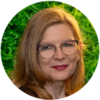 Dr hab. Joanna Petera-Zganiacz, Associate Professor at the University of Lodz, is a habilitated doctor of Earth Sciences in the field of Geography – Physical Geography, Doctor of Earth Sciences in the field of Geography. Her research interests most often focus on paleogeography, with particular emphasis on fluvial and periglacial issues. The aim of paleogeographic research is to obtain an answer to the question of what the natural environment looked like in the past; it requires a broad perspective, knowledge of the regularities governing the natural environment and awareness of the limitations of the principle of actualism in the Earth Sciences.
Dr hab. Joanna Petera-Zganiacz, Associate Professor at the University of Lodz, is a habilitated doctor of Earth Sciences in the field of Geography – Physical Geography, Doctor of Earth Sciences in the field of Geography. Her research interests most often focus on paleogeography, with particular emphasis on fluvial and periglacial issues. The aim of paleogeographic research is to obtain an answer to the question of what the natural environment looked like in the past; it requires a broad perspective, knowledge of the regularities governing the natural environment and awareness of the limitations of the principle of actualism in the Earth Sciences.
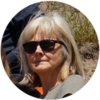 Dr hab. Danuta Dzieduszyńska, Associate Professor at the University of Lodz, is a habilitated doctor in the field of Natural Sciences, in the field of Earth Sciences in the discipline of Geography, specialization in Physical Geography. Her research interests focus on the palaeoenvironment of the final few thousand years of the Vistulian period (ca. 18,000–11,000 years BP), characterised by rapid climatic changes documented on a global scale. Paleogeographic reconstruction constitutes the subject of her scientific and research interests, which she perceives as the reproduction of interactions and elements co-creating the natural environment in the past (geological structure, relief, climate, water relations, biosphere), changing under the influence of climatic fluctuations.
Dr hab. Danuta Dzieduszyńska, Associate Professor at the University of Lodz, is a habilitated doctor in the field of Natural Sciences, in the field of Earth Sciences in the discipline of Geography, specialization in Physical Geography. Her research interests focus on the palaeoenvironment of the final few thousand years of the Vistulian period (ca. 18,000–11,000 years BP), characterised by rapid climatic changes documented on a global scale. Paleogeographic reconstruction constitutes the subject of her scientific and research interests, which she perceives as the reproduction of interactions and elements co-creating the natural environment in the past (geological structure, relief, climate, water relations, biosphere), changing under the influence of climatic fluctuations.
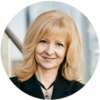 Dr Dominika Kaczorowska-Spychalska, Associate Professor at the University of Lodz, ias an advisor to the Dean of the Faculty of Management, University of Lodz for AI and digital education, Head of the Centre for Intelligent Technologies at the Faculty of Management. She is a member of the Working Group for Artificial Intelligence at the Ministry of Digital Affairs and the Section for Digital Education of the IT Committee of the Polish Academy of Sciences. She is passionate about the impact of artificial intelligence, including generative AI, on human behaviour, as well as the scope and nature of interactions between them. She strives to intensify cooperation between the scientific and research world and its socio-economic environment on the domestic and international markets, for which she has received an award from the Minister of Science and Education.
Dr Dominika Kaczorowska-Spychalska, Associate Professor at the University of Lodz, ias an advisor to the Dean of the Faculty of Management, University of Lodz for AI and digital education, Head of the Centre for Intelligent Technologies at the Faculty of Management. She is a member of the Working Group for Artificial Intelligence at the Ministry of Digital Affairs and the Section for Digital Education of the IT Committee of the Polish Academy of Sciences. She is passionate about the impact of artificial intelligence, including generative AI, on human behaviour, as well as the scope and nature of interactions between them. She strives to intensify cooperation between the scientific and research world and its socio-economic environment on the domestic and international markets, for which she has received an award from the Minister of Science and Education.
Edit: Honorata Ogieniewska, Centre for External Relations and Social Responsibility of the University, University of Lodz

